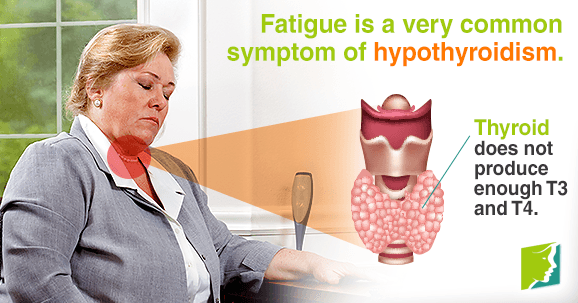When a woman enters perimenopause, she becomes more prone to thyroid problems. Thyroid problems are sometimes derived from issues with sex hormone production, which is why they are common when women are in their forties and hormone levels fluctuate in preparation for menopause. Thyroid disorders often come with many symptoms, so it's only natural to be concerned about the effects they could have on your health and lifestyle. Keep reading to learn more about the thyroid, the symptoms of an underactive and overactive thyroid, and how to limit the effects of fatigue from thyroid problems.
What Does the Thyroid Do?
The thyroid gland is located at the front of the neck, just above where the collarbones meet, below the Adam's apple. It is an essential part of the endocrine system - the thyroid produces and releases T3 and T4, the hormones that control the way cells use energy in a process commonly known as metabolism. When the thyroid produces too few or too many hormones, this has a ripple effect on metabolic activity in the body, which can result in fatigue, among other symptoms.
Hypothyroidism
Hypothyroidism is more commonly known as an underactive thyroid, a condition in which the thyroid does not produce enough T3 and T4. This disorder affects between 6 - 10% of women. Hypothyroidism is usually caused by thyroiditis - inflammation of the thyroid that damages the gland's cells and inhibits hormone production. This can result from viruses, autoimmune diseases, a weakened immune system, or pregnancy. The disorder causes a number of symptoms, including:
- Fatigue
- Weakness
- Weight gain
- Muscle pain
- Constipation
- Irregular periods
Hypothyroidism is diagnosed with a physical exam to assess external symptoms and swelling in the thyroid, as well as a blood test to examine hormone levels. Treatment is then aimed at regulating levels of the missing hormones and alleviating symptoms on a long-term basis.
Hyperthyroidism
Hyperthyroidism is another common thyroid disorder. This may sound similar to hypothyroidism, but it is essentially the opposite. Hyperthyroidism refers to an overactive thyroid, which essentially means the metabolism is over-stimulated. Fatigue is not symptomatic of an overactive thyroid, so those with hyperthyroidism generally do not have to worry about this. The symptoms of an overactive thyroid are as follows:
- Excessive sweating
- Nervousness and restlessness
- Weight loss
- Increased appetite
- Frequent bowel movements
The condition is diagnosed in the same way as hypothyroidism, and treatment is usually long-term hormone-regulating medication. However, in extreme cases, when symptoms are debilitating, thyroid removal surgery is an option.
Dealing with Hypothyroidism and Fatigue
An underactive thyroid requires long-term methods of regulation, so it's only natural to be concerned about the effects of ongoing fatigue. Characterized by extreme tiredness, lack of energy, and physical weariness, fatigue can be seriously detrimental to well-being. The medication used to regulate your thyroid disorder is likely to reduce the intensity of your symptoms and help you enjoy restful, rejuvenating sleep. Other adjustments that will help with fatigue management include:
- Following a healthy, balanced diet
- Abstaining from alcohol, spicy foods, and caffeine in the evening
- Exercising during the day
- Relaxing in the evening (e.g., a lavender aromatherapy bath or meditation session)
- Keeping a cool, ventilated sleeping environment
- Avoiding sleeping in late on weekends; follow a regular sleeping pattern
An estimated 20 million Americans have some form of thyroid disorder. It can be helpful when dealing with the condition to know that you are not alone. While conditions such as hypothyroidism have the potential to become lifestyle-impairing, the symptoms are manageable if you are willing to make adjustments to your habits to do so.
Sources
- Better Health Channel. (2014). Thyroid - hypothyroidism. Retrieved June 10, 2014, from http://www.betterhealth.vic.gov.au/bhcv2/bhcarticles.nsf/pages/Thyroid_disorders_hypothyroidism
- National Health Service UK. (2012). Overactive thyroid - symptoms. Retrieved June 10, 2014, from http://www.nhs.uk/Conditions/Thyroid-over-active/Pages/Symptoms.aspx
- National Institutes of Health. (2013). Hypothyroidism: MedlinePlus Medical Encyclopedia. Retrieved June 10, 2014, from http://www.nlm.nih.gov/medlineplus/ency/article/000353.htm
- Office on Women's Health. (2012). Thyroid disease fact sheet. Retrieved June 10, 2014, from http://womenshealth.gov/publications/our-publications/fact-sheet/thyroid-disease.html




